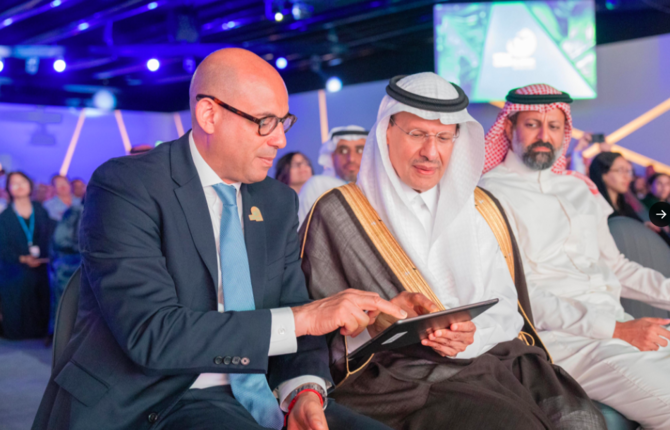
- ARAB NEWS
- 14 Jul 2025

RIYADH: Saudi Arabia on Monday launched a mechanism allowing companies to purchase credits offsetting greenhouse emissions as part of its efforts to achieve net-zero emissions by 2060.
The Kingdom’s Clean Development Mechanism Designated National Authority unveiled the initiative at MENA Climate Week 2023 in Riyadh.
The Greenhouse Gas Crediting and Offsetting Mechanism, set to launch in early 2024, “aims to increase cooperation among national entities seeking to fulfill their climate ambitions by helping to mobilize finance in all sectors for a variety of projects and activities,” according to its website.
The contours of the project were first announced by Saudi Energy Minister Prince Abdulaziz bin Salman at the Saudi Green Initiative held during COP27 in Sharm El-Sheikh, Egypt, in November 2022.
Under a carbon credit market system, businesses are given a set number of carbon credits, which represent the amount of emissions they are allowed to produce. If a business produces more emissions than its allotted credits, it must purchase additional credits from other businesses that have produced fewer emissions than their allotted credits.
In Saudi Arabia, the nationally determined contributions have gone up by twofold, said Nora Al-Sudairy, a sustainability expert at the Designated National Authority.
An NDC is a climate action plan to cut emissions and adapt to climate impacts. Each party to the Paris Agreement is required to establish an NDC and update it every five years.
“We’re now targeting that to 278 million tons of reduced (emissions) per annum in our index by 2030. We also have many climate ambitions like the (goal of achieving) net zero by 2060. GCOM was created and designed for the Kingdom’s needs. We’re enabling the private sector to operationalize their projects and reduce their emissions,” she told Arab News.
Al-Sudairy also said the private sector will also be incentivized for its efforts to cut emissions.
Atheer Al-Kabsi, a senior environmental engineer at DNA, said with the new system in place, the Kingdom’s domestic carbon credit market will help businesses and individuals to offset their emissions by supporting carbon reduction projects. He said it encourages businesses to invest in clean energy technologies.
“GCOM has eight steps starting from operation and planning to credit issuance,” she told Arab News.
Al-Kabsi stressed the need for investing in new technologies to ensure sustainable efforts to reduce emissions. “Once (companies) they’ve established a technology or a project that reduces emissions, they can come and register under GCOM if they’re eligible and they can issue credits and these credits or certificates would help them monetize these projects. They can also use it to offset their own emissions,” she added.
In order to ensure sustainability, the first step is to identify vulnerabilities and identifying the issues at the community level, according to Ramon Sanchez, director and sustainable technologies and health program research associate at Harvard University’s Environmental Health Department.
“The key to a successful business model that can withstand the ever-changing climate … can be summarized as moneymaking or a money saver for them (businesses),” according to Sanchez, “and at the same time, we are saving the planet.”
He said businesses should have the knowledge of their surroundings and global issues and they must develop the skills of their employees to cope with any change.
“Sustainability should be seamless. You should not notice that you are doing something sustainable,” he added.
Climate resilience projects are imperative to reducing carbon footprints because they help to reduce the need for energy-intensive adaptation measures in the future. Furthermore, carbon finance will be key for the implementation of the NDCs, and the Paris Agreement enables the use of such market mechanisms through Article 6 and the interest in carbon markets is growing.
By providing a framework for international cooperation on climate change mitigation, Article 6 can help to lower the cost of reducing emissions and promote investment in clean technologies.
“The projects will not necessarily be viable without the existence of something like GCOM to incentivize investment and those technologies that are really expensive, to incentivize investments in nature-based solutions that are also equally expensive, if not more expensive sometimes,” Maria Aljishi, international policy adviser for DNA told Arab News.
“It really is meant to help support these initiatives that you mentioned, like SGI. If they need some kind of incentives from a carbon credit that is traded on a domestic level, then that is something where GCOM comes into play. That’s something where they can they can utilize GCOM if they follow the requirements and the guidelines that are set out by the mechanism, then it creates an avenue of revenue to make the projects more viable to exist, allowing us as a country to achieve more and increase our ambition, even though we are already very extremely ambitious,” she added.
Article 6 is also important for the carbon market because it provides a way to ensure that carbon credits are generated from real and verifiable emission reductions. This is important for maintaining the integrity of the carbon market and for ensuring that businesses and consumers can trust that the carbon credits they purchase are making a real difference in the fight against climate change.
“Markets are something new for us in the country and in fact, in the entire region. I believe that GCOM is the first market mechanism of its kind in the entire MENA region,” she added.